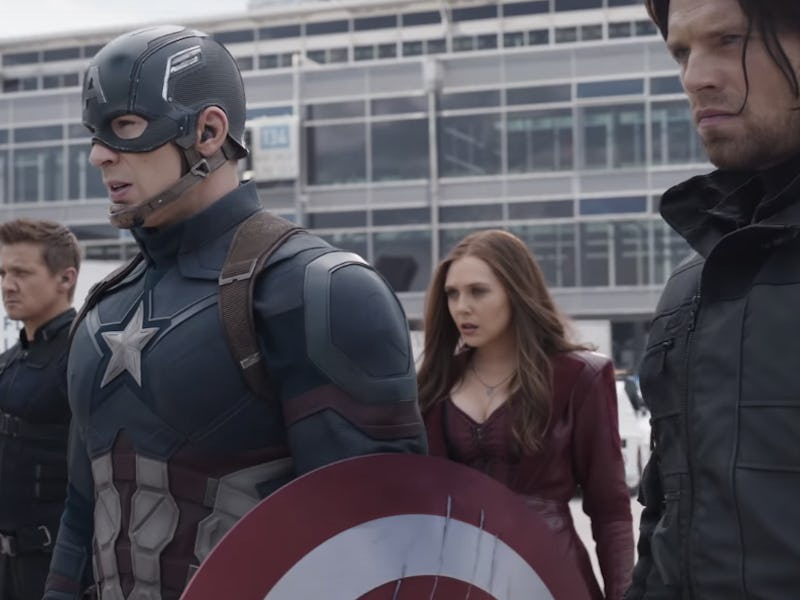Experts Predict Crazy Long Marvel 'Civil War' Will Use Emotions to Hold Interest
How long is too long for a superhero movie? We asked two attention experts to explain.

Die-hard Marvel fans rejoiced when AMC announced the official runtime for Captain America: Civil War. At 2 hours and 27 minutes, it’s the longest Marvel film yet, outlasting The Avengers by four minutes and Avengers: Age Of Ultron by six. Long is the new normal for superhero movies — DC’s Batman v Superman: Dawn of Justice clocks in at 2 hours and 22 minutes — which can be exasperating for fans less consumed by comic book mythology. In the past, Marvel has managed to keep butts in seats using massive set pieces and Whedonisms, but Civil War is heavier fare. Do people really want to sit through that long a disquisition on the nature of concentrated authority?
All movies are, in a sense, “too long” for our attention spans, explains Jason Chein, Ph.D., a Temple University attention specialist. “On average, people will break attention after as little as five to seven minutes,” he tells Inverse. What makes a long movie good is how effectively it can reel our constantly wandering brains back in.
“It’s okay for attention to drift off as long as you can reorient attention eventually to what you’re trying to focus on,” he explains. “In the context of watching a movie, you have a new stimulus in front of you, something newly engaging, and you’re going to revisit it.” He’s saying the Russo Brothers and Zack Snyder better be able to keep keeping things fresh over the course of their films. “The recommendation is to shake it up a little bit.”
Milking this bromance for its emotional worth will keep viewers in the game.
Some people, of course, will be harder to draw back in than others, notes Gaurav H. Patel, Ph.D., a Columbia University psychiatrist and neuroscientist. “There doesn’t seem to be any single number or range of people’s abilities to sit through something like a movie,” he tells Inverse. The spectrum is broad. People with severe ADHD, for example, can hardly focus long enough to read a paragraph, whereas fighter pilots can stare at the same thing for 18 hours. In his own experiments, he uses The Good, The Bad, and The Ugly — the classic western loved by some and detested by others for its 20-minute silences — to sort shorter attention spans from the long ones. His research has led him to think that what really keeps viewers from wandering off — even more than intense battle scenes and wide-scale destruction — is the ability to keep them emotionally involved.
He points to the work of Princeton neuroscientist Uri Hasson, who has suggested that films that are more engaging — that is, those that ask viewers to identify or think about characters or integrate information over longer periods of time — are harder to watch but ultimately keep viewers roped in.
Captain America: Civil War is essentially a meditation on the shifting relationships between three brooding dudes. While your run-of-the-mill action flick might not succeed at getting depth from thin characters, superhero films are, post-Dark Knight superhero films have historically clicked.
Because superhero movies unapologetically deliver high-intensity scenes like this one at a rapid pace, they might be the best candidates for extended screentime.
That’s not to say that the onus to keep us at attention is entirely on the filmmaker. The interaction goes both ways. If people are invested in the storyline and characters even before they sit down to watch a film, it’s obviously going to be easier for them to refocus their attention. After all, Patel points out, the 5-hour extended editions of The Lord of the Rings trilogy exist for a reason. Some people want nothing more than to dive in.
The science community, Patel admits, is only just “beginning to understand” what engages us when movies run overtime. For all of the scientific studies exploring the intersection of movies and attention span, it’s ironic that filmmakers have more or less boiled it down to a science without having to resort to laboratory experimentation. While scientists have yet to determine the optimal movie length, Patel speculates that most attention spans naturally max out after two or three hours.
“My guess about these things is that filmmakers intuit some of the natural phenomenon of attention,” says Chein. “They don’t read the science, they don’t know what works, but they can figure out pretty quickly what captures it.”
In Captain America: Civil War, that means milking the tension between best frenemies Cap and Iron Man for all of its dramatic worth and allowing viewers to dive deep into Bucky’s twisted motivation for firing bullets at a partially armored Tony. Not jaded by his analytic understanding of attention grabbing, Patel is sold.
“I’m certainly looking forward to it,” says Patel. “And I think I will be engaged.”